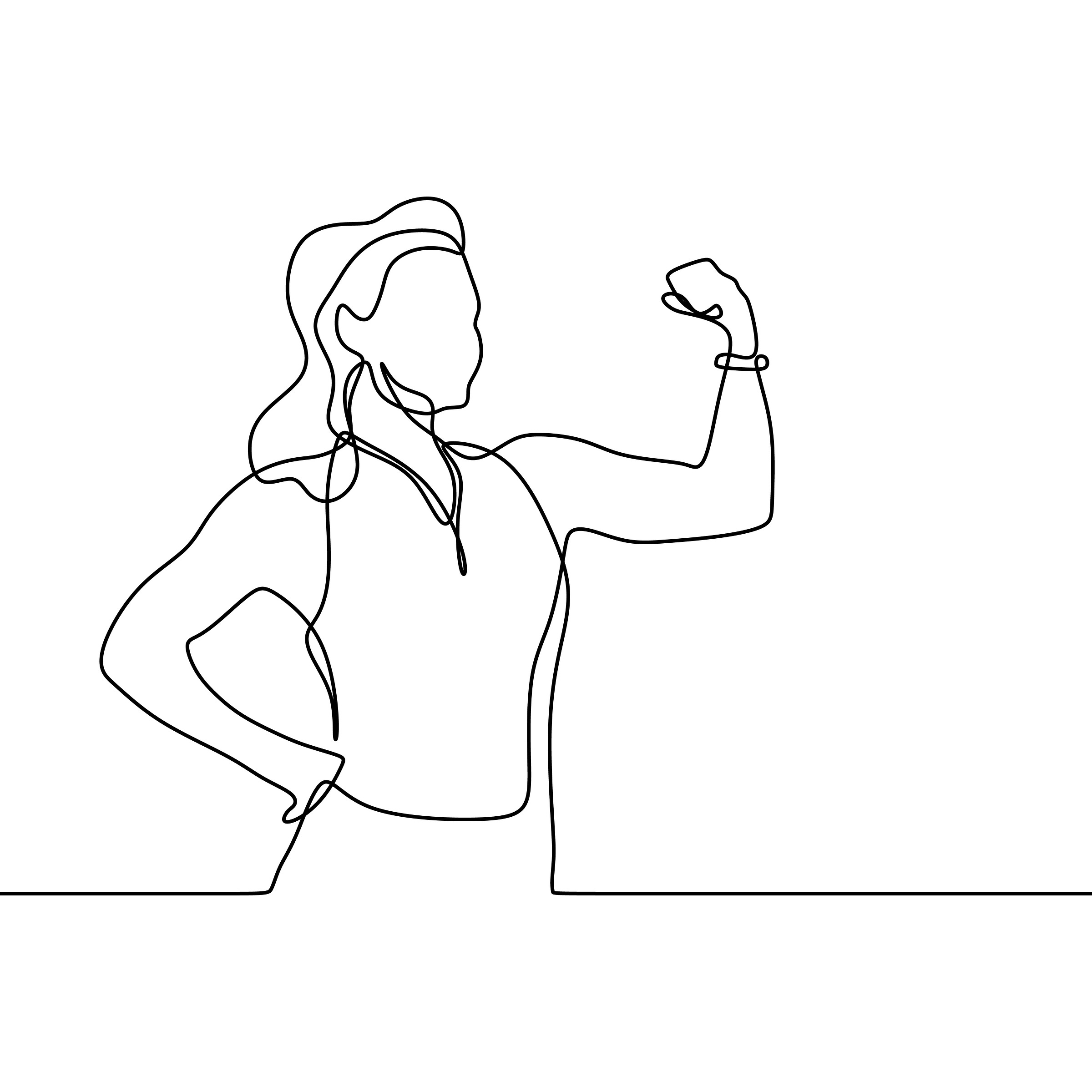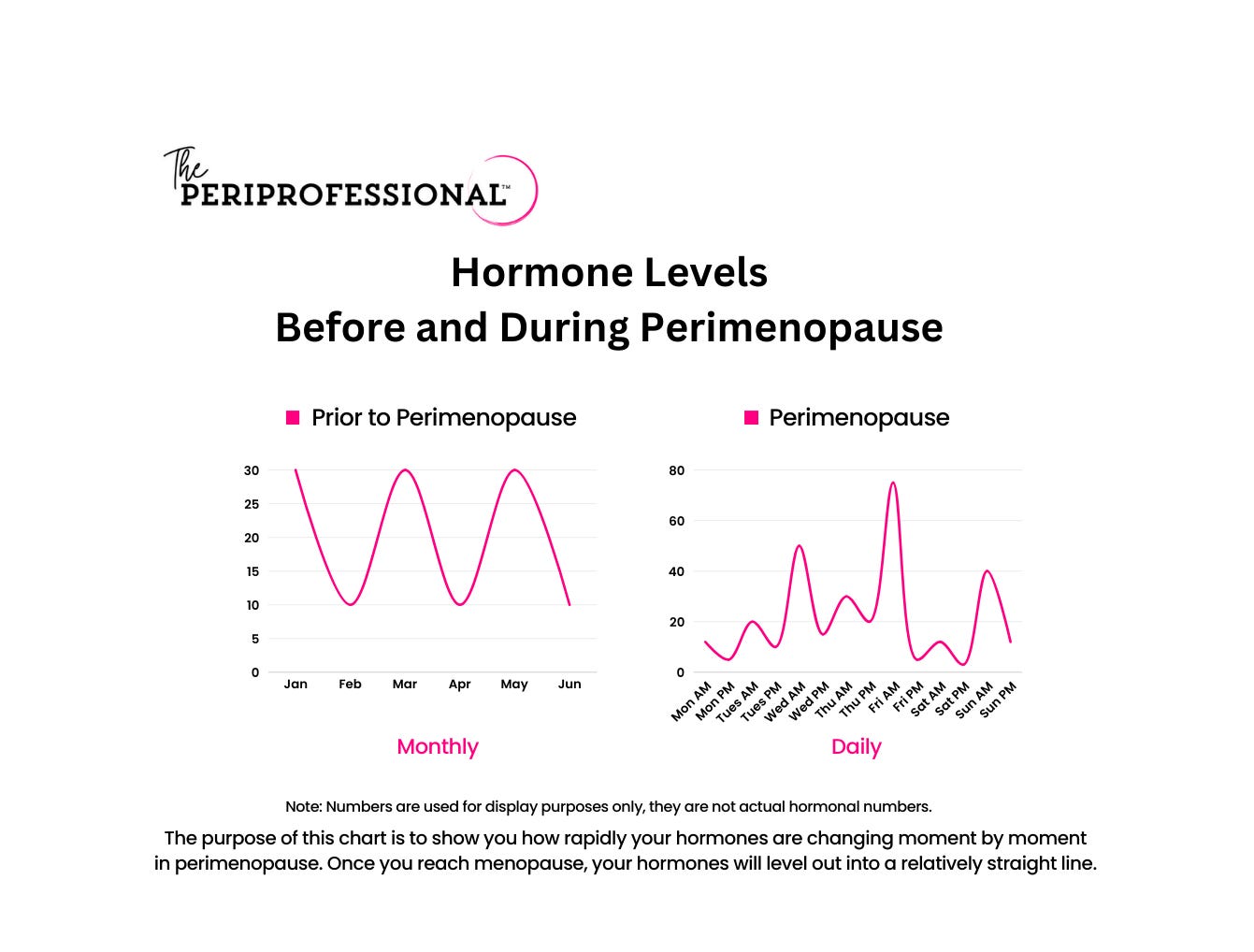Being in perimenopause is a lot like being an athlete; it can challenge you in ways you never could imagine. It can be grueling, and you will need sheer determination to get through the hard days. It lasts, on average, 5-7 years but spans 2 - 14 years prior to that one day when you reach menopause, the day when you haven’t had a period or seen any blood for 365 days.
I guess I’m an ultra-endurance perimenopause athlete because I’ve been in this transition to menopause for over seven years already. And, there’s no end in sight yet. I haven’t yet started the 365 days of waiting with no periods. My periods have been ping-ponging around more than a ping-pong. Every time I think I’ve missed a month or two, nope, the darn thing comes back. Every time I think I’ve purchased my last box of menstrual products, I do a song and dance thinking I’ve purchased my last box. The cashier at the store is waiting for it too, although I imagine she’ll miss my celebration each time I’m there.
When Did it Start?
Since there’s no test to determine if a woman is perimenopausal, you may be asking yourself, “How do I know if I’m perimenopausal?” I didn’t know when it started at the time; it’s only now, in retrospect, that I can see when it started for me. It’s much easier to know when it starts if you know what to look for. And, it’s not periods and hot flashes.
When perimenopause started for me back around 2017, there wasn’t as much information available as there is now. I was under the wrong assumption that it started once I began skipping periods and getting hot flashes. So it wasn’t until then, in 2021, that I pieced together what was going on with my body. From 2017 until 2021, I was very confused by subtle changes happening in my body, even though I was 47 when it first showed up.
And, by subtle, I mean weird and wonky things that made me think I was either turning into an alien or dying. My body was acting in funny ways that caused me to deal with things that I had never had to deal with before, like heart palpitations, breathlessness, itchy ears, tingling sensations, muscle twitching, sensitive skin, mood changes, and anxiety, just to name a few. Symptoms I already had, like hearing loss and ringing in the ears, got worse.
Our media does women a disservice by only talking about the symptoms of menopause as hot flashes, night sweats, and skipped periods. As you’ll learn by reading my articles on this site, you’ve already started perimenopause, possibly years prior to ever exhibiting those “classic” symptoms of missed periods and hot flashes.
First Symptoms
A friend asks: “How do I know I’ve started perimenopause?”
My reply: “Have you started swearing yet?”
The very first symptom most women have, possibly years before skipping periods and getting hot flashes, is a change in their moods and an increase in anxiety and/or depression. That’s because progesterone, the Netflix and chill hormone, is the first hormone to drop off, leaving our estrogen-progesterone balance out of whack. Dr. Daved Rosensweet (a top MD hormone expert) says progesterone can start dropping as early as the 30s.
Furthermore, this imbalance causes dominant estrogen, an imbalance between your estrogen and progesterone, and is known to spike our cortisol (the stress hormone). Your body uses cholesterol to make cortisol and progesterone, but when stress is high, it will prioritize making cortisol first to help you deal with stress.
Therefore, your body will start to make less progesterone. This is yet another reason why it’s important to learn how to manage stress so that there is some cholesterol left over to make progesterone. Keep in mind that you may not be feeling any external stress, but going through perimenopause is, in and of itself, a stressor to the body.
As you age and reach menopause, your progesterone and estradiol estrogen will still drop to basically zero; we can’t stop it, but we can manage the effects of fewer hormones by managing stress. We have to manually take over the task of what our female hormones did for us by being good caretakers of our bodies. Managing cortisol is key.
Cortisol
When baseline cortisol rises, so will your anxiety. Your stress resilience will lower. Things that never bothered you before will begin to bother you.
You may start to avoid loud noises, crowds, and anything that is overwhelming to your sensory organs (eyes, ears, nose, skin, mouth). Your nerves may feel “fried,” and you could be feeling tired but wired. Your concentration and focus will be nowhere to be found. Your patience will be in the toilet, and you may rage against your family unexpectedly and for minor things. The good news is that there are things that we can take control of to help ourselves, so consider subscribing to stay updated on all of my latest information.
Cortisol is meant to be released during an active threat and then decline following a stressful event. In this way, it’s helpful and works perfectly. However, because of the hormonal changes I described above, baseline cortisol can increase during perimenopause.1
Your Body is Not Betraying You
There are many components at play during perimenopause. The body is all connected and works in amazing ways. If you feel like your body is trying to betray you by forcing you through this, I gently suggest looking at this from a different perspective by realizing that your body is working very hard during this transition to keep you balanced and in equilibrium. It may not feel like it at times, but it is.
Your body is going through a major change (they don’t call menopause “the change” for nothing) and is working in your favor, but it will take time to adjust. There are so many things that your body is trying to adjust for you simultaneously. No wonder why it causes so much disruption.
In the meantime, there are things that you can do to be a good caretaker of your body. It’s counting on you. We’ll cover a lot of lifestyle suggestions in future posts. Please consider subscribing so articles can be delivered directly to your email.
I’m an Elder Peri
If you’re like me and older than the average age of menopause (52 in the US), there’s no need to be concerned. It just means you’ll get a few bonus periods than the American average of 400-450 periods in a woman’s lifetime. There have been some studies showing that the older you are at menopause, the healthier your aging process will be. Keeping your hormones in play is a matter of “the longer, the better.”
I made up the term “Elder Peri” to describe me as an older perimenopausal woman. It’s a nod to Iliza Shlesinger’s stand-up comedy special called “Elder Millennial.” I’m an outlier among my friends of the same age, they are already menopausal.
No matter what your age is, perimenopause can be a difficult transition between what was and what is coming. You aren’t alone, and more women are opening up about their experiences online and in person every single day. Collectively, we can change the landscape of women’s health in midlife. Keep talking!
Need a better understanding of hormones before and during perimenopause? Your Hormones are Pooh
Would you like an overview of perimenopause with an FAQ? Perimenopause, huh?
Be well, stay cool…
Upon subscribing, you will receive a welcome email! If you don’t receive it immediately, check your spam folder. Once you subscribe, you’ll also have access to email me personally about something I’ve written.
PNG Image Designed By ngupakarti
Woods NF, Mitchell ES, Smith-Dijulio K. Cortisol levels during the menopausal transition and early postmenopause: observations from the Seattle Midlife Women's Health Study. Menopause. 2009 Jul-Aug;16(4):708-18. doi: 10.1097/gme.0b013e318198d6b2. PMID: 19322116; PMCID: PMC2749064. The Periprofessional’s Note: There is very little research done on perimenopausal women. This study features late-stage menopause transition and early menopausal women.








Found you through a random Substack post comment section. Started my peri journey at 40. I'm 45 and it seems each year brings on new and crazy stuff! Adrenal crash and thyroid tank happened this year for me.
The fatigue was similar to CFS. I, too have had Epstein Barre. So maybe there is a connection? But also found mold growing in my walls of a house only 1 1/2 yrs old! Hoping some symptoms improve once I do the mold detox protocol. We'll see. One symptom was crazy muscle cramps in the middle of the night despite my potassium, salt, magnesium levels being great! Now it is just muscle twitches. Yes to brain fog, although better now that I am on adrenal support supplements etc.
All that to say, I love your article on cortisol and look forward to reading more.
My Substack is Go With The Flow: Women's Cycle Awareness. I discuss the different phases of the menstrual cycle and how to support each phase to optimize the unique gifts that come with each one. Since you are still menstruating, you may find them helpful.
Also a great book that addresses menopause from a psychological angle is Wise Power by Alexandra Pope and Sjanie Worlitzer.
They are menstrual cycle awareness pioneers.
Can't wait to read more of your content!
This is so wild. I think it's been seven years for me too, which puts me as entering peri at around age 34. Some of your first symptoms you list: breathlessness, itchy ears, tingling sensations, muscle twitching - those were mine too and began in 2017. Because I didn't know it was peri I began an odyssey of trying to figure out what was wrong - especially since my symptoms were so neurologically-based the routes of B12 deficiency and MS were taken, ultimately coming up cold. In 2020 I experienced bone-crushing fatigue that lasted for 3 solid years so my primary doc landed on CFS / ME. But it turns out that all along, peri! What a rollercoaster from a fever dream this has all been.
Thank you for putting the cortisol / anxiety stuff in perspective too - that's very helpful considering it's one of my main symptoms. And the reminder that our bodies aren't betraying us, they're actually doing all they can to keep us in balance. I'll try to keep that with me during the harder parts. Looking forward to reading more.